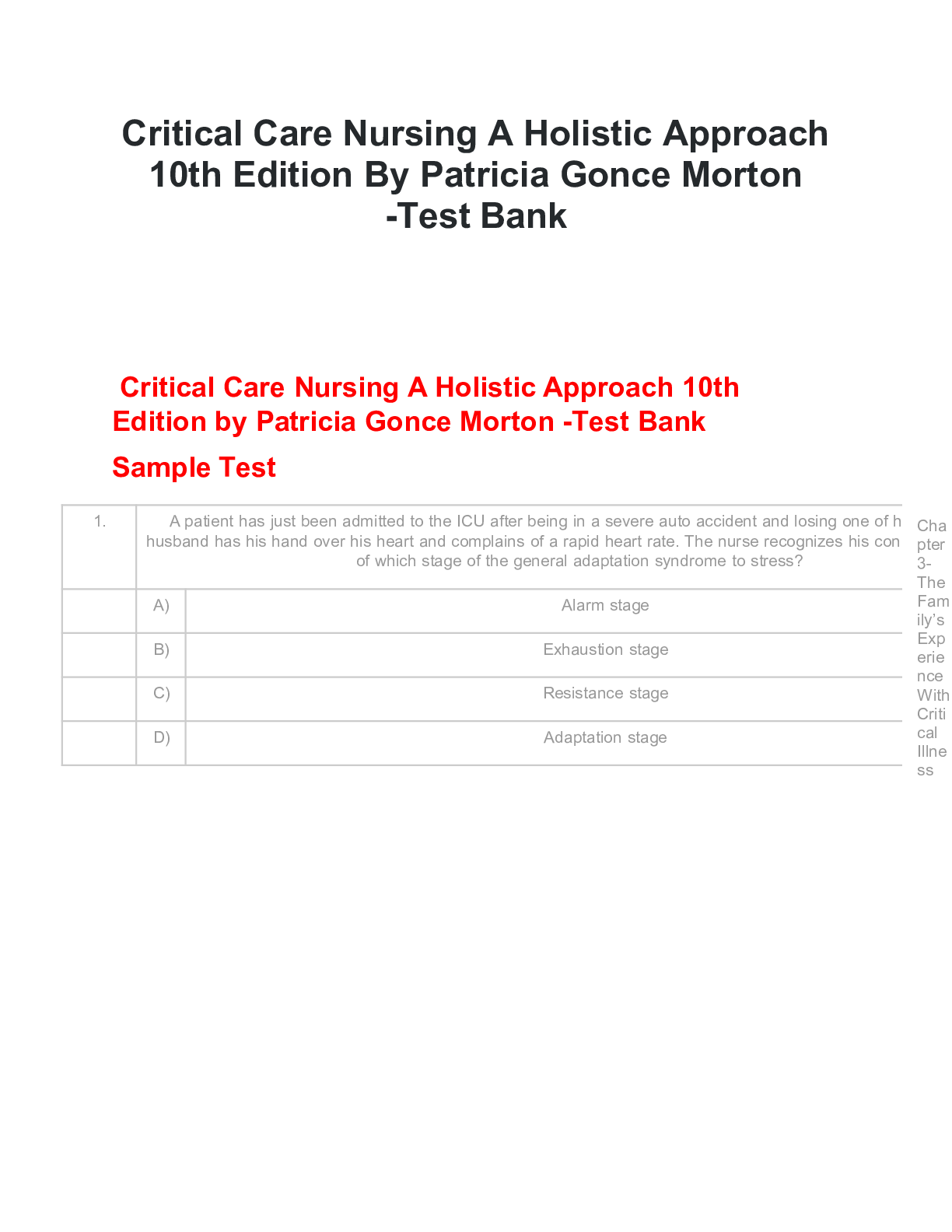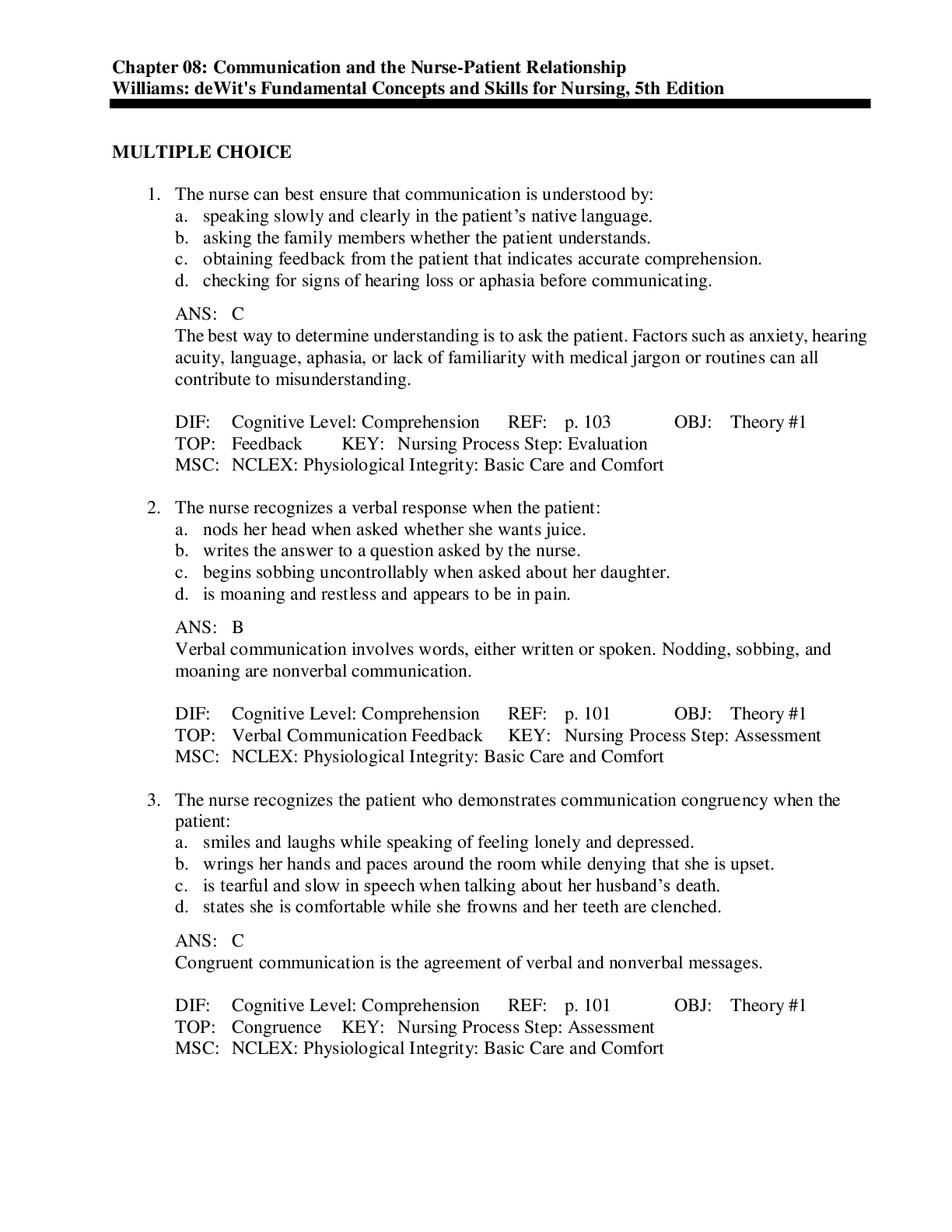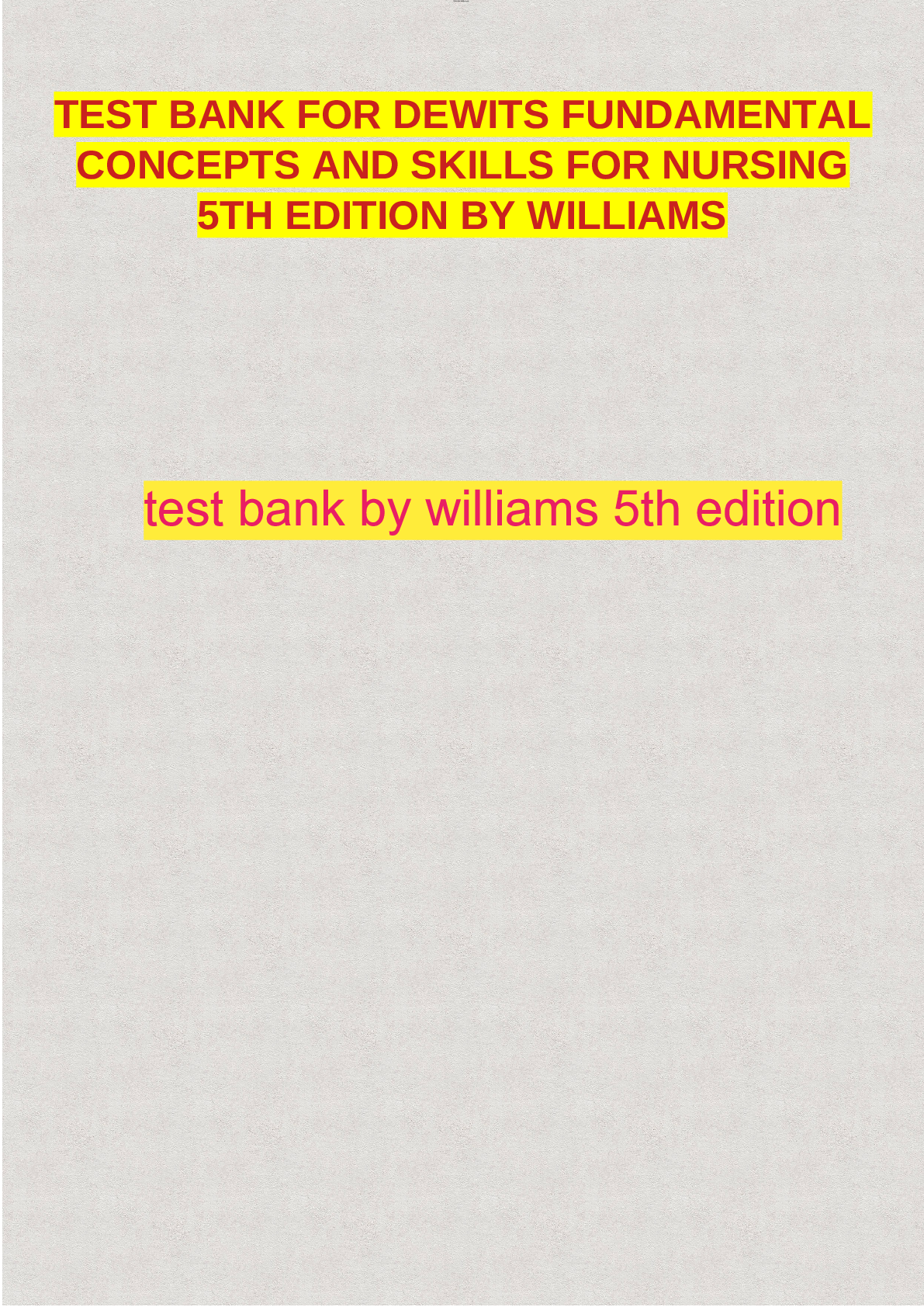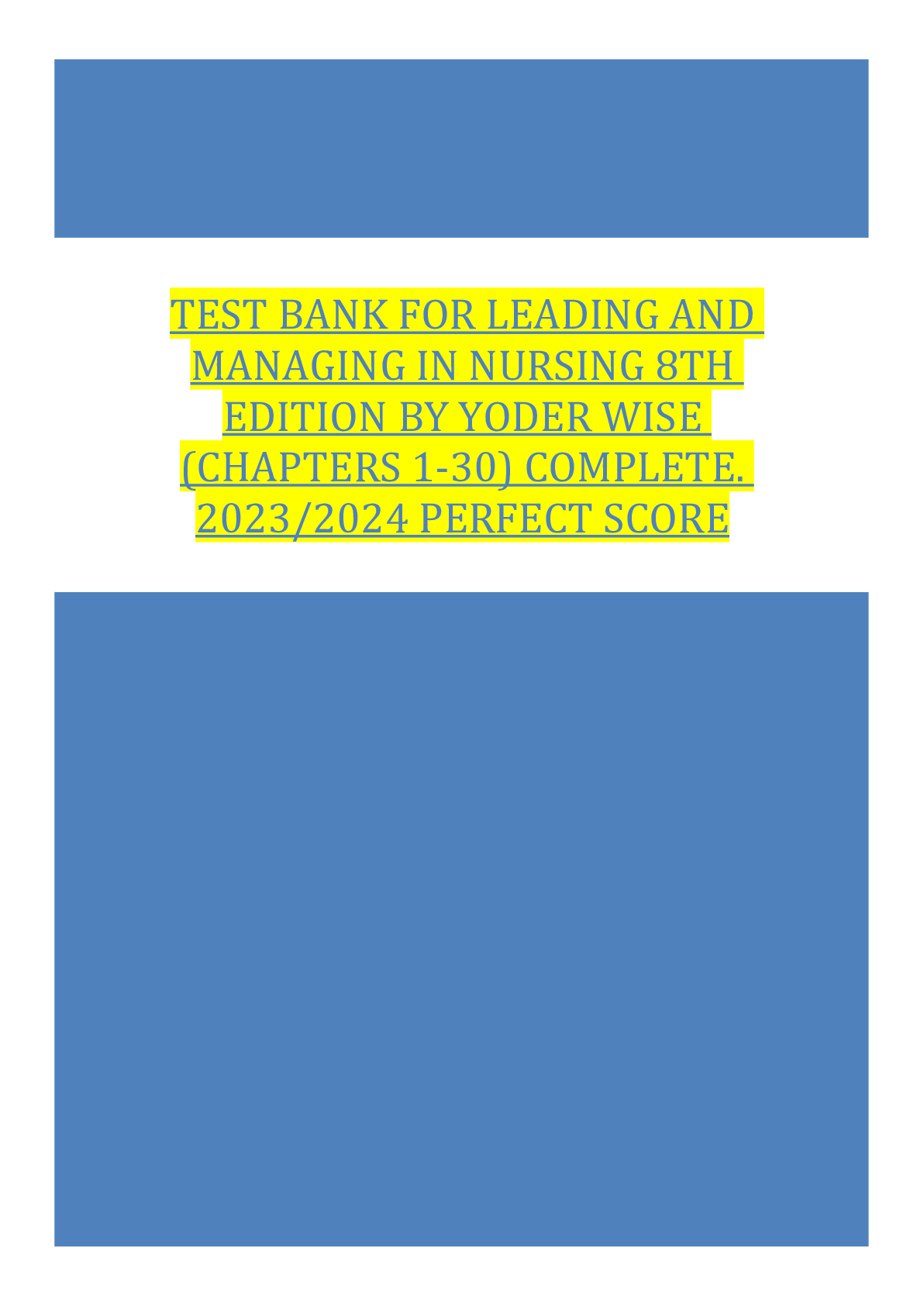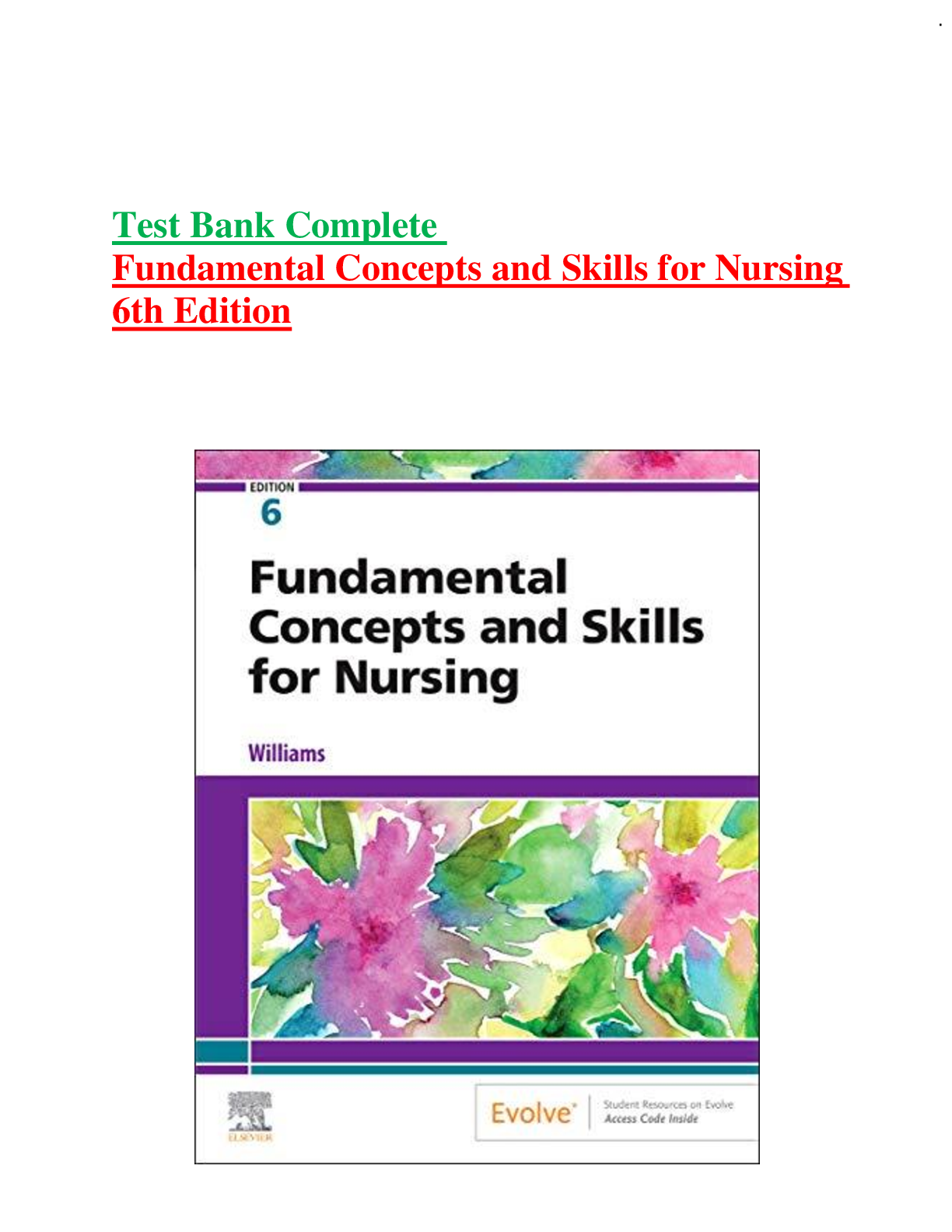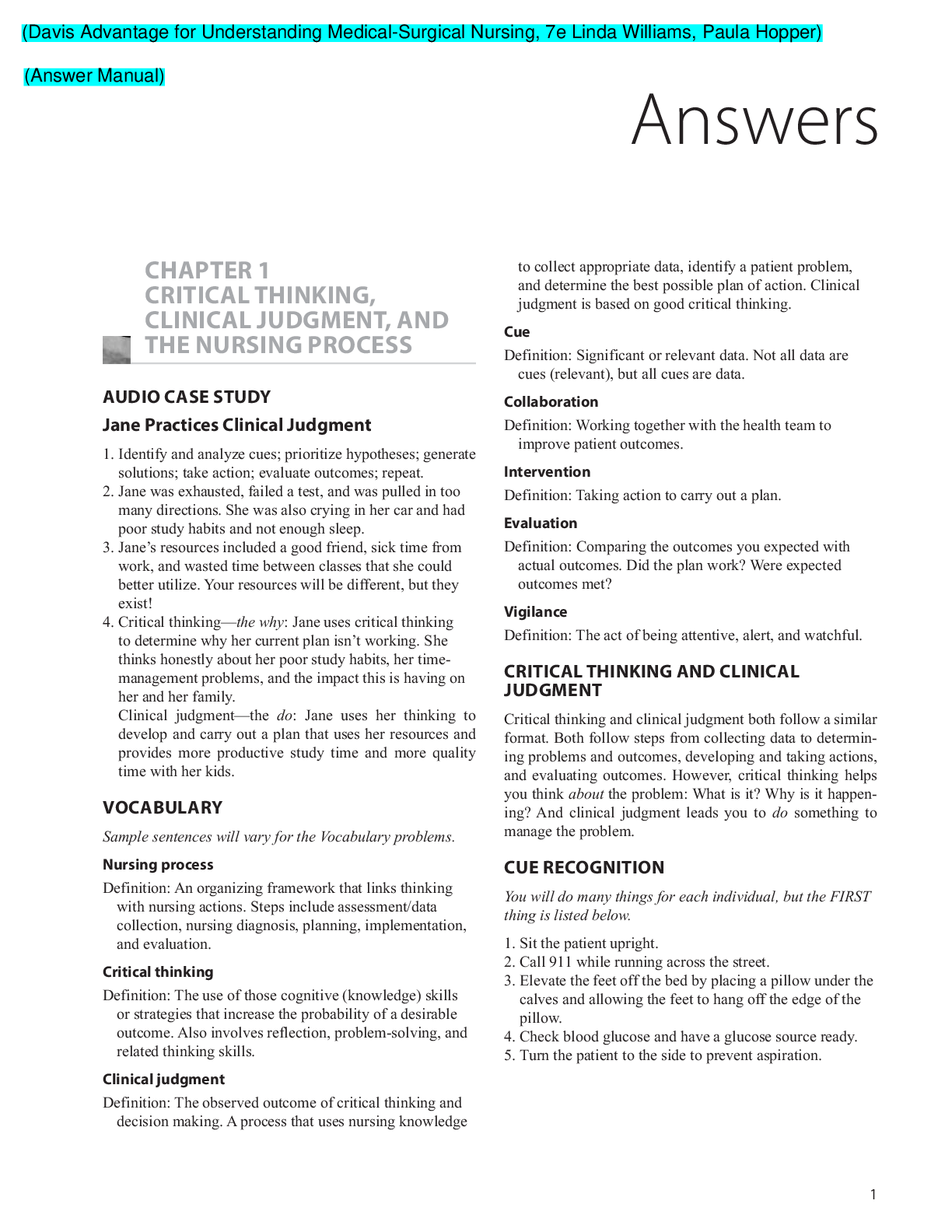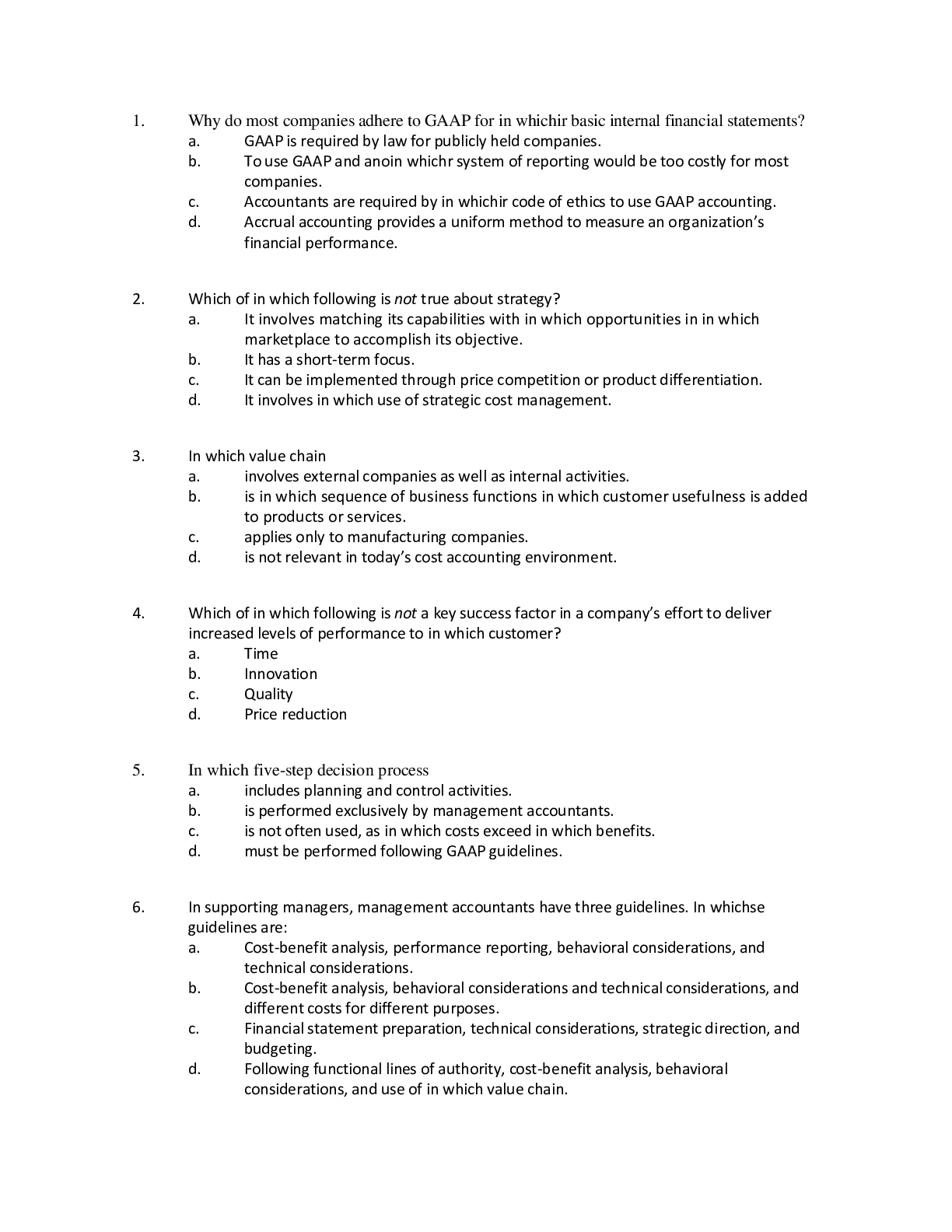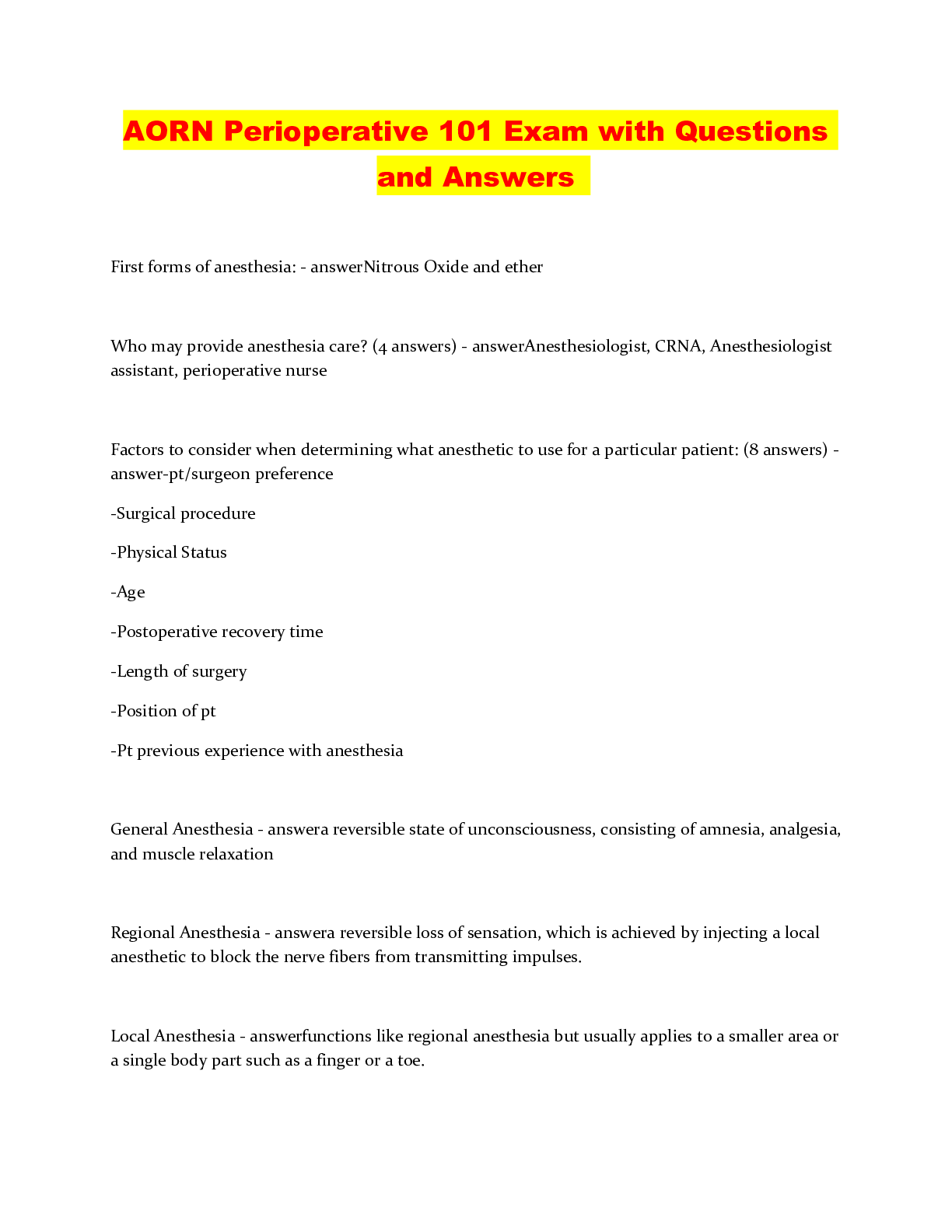*NURSING > QUESTIONS & ANSWERS > DeWit’s Fundamental Concepts And Skills for Nursing, 5th Edition By Patricia A. Williams -Test Ban (All)
DeWit’s Fundamental Concepts And Skills for Nursing, 5th Edition By Patricia A. Williams -Test Bank
Document Content and Description Below
DeWit’s Fundamental Concepts And Skills for Nursing, 5th Edition By Patricia A. Williams -Test Bank To purchase this Test Bank with answers, click the link below https://examquizes.com/product/d... ewits-fundamental-concepts-and-skills-for-nursing-5th-edition-bypatricia-a-williams-test-bank/ Description DeWit’s Fundamental Concepts And Skills for Nursing, 5th Edition By Patricia A. Williams -Test Bank Sample Questions Instant Download With Answers DeWit’s Fundamental Concepts Chapter 03: Legal and Ethical Aspects of Nursing Williams: deWit’s Fundamental Concepts and Skills for Nursing, 5th Edition MULTIPLE CHOICE 1. A student nurse who is not yet licensed: a. may not perform nursing actions until he or she has passed the licensing examination. b. is not responsible for his or her actions as a student under the state licensing law. c. are held to the same standards as a licensed nurse. d. must apply for a temporary student nurse permit to practice as a student. ANS: CStudent nurses are held to the same standards as a licensed nurse. This means that although a student nurse may not perform a task as quickly or as smoothly as the licensed nurse would, the student is expected to perform it as effectively. In other words, she must achieve the same outcome without harm to the patient. The student is legally responsible for her own actions or inaction, and many schools require the student to carry malpractice insurance. DIF: Cognitive Level: Knowledge REF: p. 32 OBJ: Theory #1 TOP: Practice Regulations for the Student Nurse KEY: Nursing Process Step: N/A MSC: NCLEX: N/A 2. During an employment interview, the interviewer asks the nurse applicant about HIV status. The nurse applicant can legally respond: a. “No,” even though he or she has a positive HIV test. b. “I don’t know, but I would be willing to be tested.” c. “I don’t know, and I refuse to be tested.” d. “You do not have a right to ask me that question.” ANS: D In employment practice, it is illegal to discriminate against people with certain diseases or conditions. Asking a question about health status, especially HIV or AIDS infection, is illegal. DIF: Cognitive Level: Application REF: p. 34 OBJ: Clinical Practice #1 TOP: Discrimination KEY: Nursing Process Step: N/A MSC: NCLEX: N/A3. An example of a violation of criminal law by a nurse is: a. taking a controlled substance from agency supply for personal use. b. accidentally administering a drug to the wrong patient, who then has a serious reaction. c. advising a patient to sue the doctor for a supposed mistake the doctor made. d. writing a letter to the newspaper outlining questionable or unsafe hospital practices. ANS: A Theft of a controlled substance is a federal crime and consequently a crime against society. DIF: Cognitive Level: Application REF: p. 32 OBJ: Theory #2 TOP: Criminal Law KEY: Nursing Process Step: N/A MSC: NCLEX: N/A 4. The LPN (LVN) assigns part of the care for her patients to a nursing assistant. The LPN is legally required to perform which of the following for the residents assigned to the assistant? a. Toilet the residents every 2 hours and as needed. b. Feed breakfast to one of the residents who needs assistance. c. Give medications to the residents at the prescribed times. d. Transport the residents to the physical therapy department.ANS: C Toileting, feeding, and transporting residents or patients are tasks that can be legally assigned to a nurse’s aide. Administering medications is a nursing act that can be performed only by a licensed nurse or by a student nurse under the supervision of a licensed nurse. DIF: Cognitive Level: Application REF: p. 33 OBJ: Theory #3 TOP: Delegation KEY: Nursing Process Step: Implementation MSC: NCLEX: Safe, Effective Care Environment: Coordinated Care 5. If a nurse is reported to a state board of nursing for repeatedly making medication errors, it is most likely that: a. the nurse will immediately have his or her license revoked. b. the nurse will have to take the licensing examination again. c. a course in legal aspects of nursing care will be required. d. there will be a hearing to determine whether the charges are true. ANS: D The nurse may have his or her license revoked or be required to take a refresher course, but this would be based on the evidence presented at a hearing. The licensing examination is not usually required as a correction of the situation as described. DIF: Cognitive Level: Knowledge REF: p. 33 OBJ: Theory #3 TOP: Professional Discipline KEY: Nursing Process Step: N/A MSC: NCLEX: N/A6. A nurse co-worker arrives at work 30 minutes late, smelling strongly of alcohol. The fellow nurses’ legal course of action is to: a. have the nurse lie down in the nurses’ lounge and sleep while others do the work. b. state that, if this happens again, it will be reported. c. report the condition of the nurse to the nursing supervisor. d. offer a breath mint and instruct the nurse co-worker to work. ANS: C Nurses must report the condition. It is a nurse’s legal and ethical duty to protect patients from impaired or incompetent workers. Allowing the impaired nurse to sleep enables the impaired nurse to avoid the consequences of his or her actions and to continue the risky behavior. Threatening to report “the next time” continues to place patients at risk, as does masking the signs of impairment with breath mints. DIF: Cognitive Level: Application REF: p. 33 OBJ: Theory #3 TOP: Professional Discipline KEY: Nursing Process Step: N/A MSC: NCLEX: N/A 7. When a student nurse performs a nursing skill, it is expected that the student: a. performs the skill as quickly as the licensed nurse. b. achieves the same result as the licensed nurse. c. not be held to the same standard as the licensed nurse. d. always be directly supervised by an instructor.ANS: B Students are not expected to perform skills as quickly or as smoothly as experienced nurses, but students must achieve the same result in a safe manner. DIF: Cognitive Level: Comprehension REF: p. 33 OBJ: Theory #1 TOP: Practice Regulations for the Student Nurse KEY: Nursing Process Step: N/A MSC: NCLEX: N/A 8. If a nurse receives unwelcome sexual advances from a nursing supervisor, the first step the nurse should take is to: a. send an anonymous letter to the nursing administration to alert them to the situation. b. tell the nursing supervisor that she is uncomfortable with the sexual advances and ask the s c. report the nursing supervisor to the state board for nursing. d. resign and seek employment in a more comfortable environment. ANS: B The first step in dealing with sexual harassment in the workplace is to indicate to the person that the actions or conversations are offensive and ask the person to stop. If the actions continue, then reporting the occurrence to the supervisor or the offender’s supervisor is indicated. DIF: Cognitive Level: Application REF: p. 34 OBJ: Clinical Practice #1TOP: Sexual Harassment KEY: Nursing Process Step: N/A MSC: NCLEX: N/A 9. A person who has been brought to the emergency room after being struck by a car insists on leaving, although the doctor has advised him to be hospitalized overnight. The nurse caring for this patient should: a. have him sign a Leave Against Medical Advice (AMA) form. b. tell him that he cannot leave until the doctor releases him. c. immediately begin the process of involuntary committal. d. contact the person’s health care proxy to assist in the decision-making process. ANS: A A person has the right to refuse medical care, and agencies use the Leave AMA to document the medical advice given and the patient’s informed choice to leave against that advice. DIF: Cognitive Level: Application REF: p. 39 OBJ: Clinical Practice #3 TOP: Patient Rights KEY: Nursing Process Step: Implementation MSC: NCLEX: N/A 10. The information in a patient’s medical record may legally be: a. copied by students for use in school reports or case studies. b. provided to lawyers or insurers without the patient’s permission. c. shared with other health care providers at the patient’s request.d. withheld from the patient, because it is the property of the doctor or agency. ANS: C A release or consent is required to provide information from a patient’s medical record to anyone not directly caring for that patient. The patient must provide consent to provide information to insurers, lawyers, or other health care agencies or providers. The patient has the right to access the information in his or her medical record (copies), but the agency or doctor retains ownership of the document. DIF: Cognitive Level: Application REF: p. 39 OBJ: Theory #5 TOP: Legal Documents KEY: Nursing Process Step: N/A MSC: NCLEX: N/A 11. If a patient indicates that he is unsure if he needs the surgery he is scheduled for later that morning, the nurse would best reply: a. “Your doctor explained all of that yesterday when you signed the consent.” b. “Your doctor is in the operating room; she can’t talk to you now.” c. “You should have the surgery; your doctor recommended that you have it.” d. “I will call the doctor to speak with you before you go to the operating room.” ANS: DA consent can be withdrawn at any time before the treatment or procedure has been started. The primary care provider should be notified by the supervising nursing staff of the unit. DIF: Cognitive Level: Application REF: p. 38 OBJ: Clinical Practice #4 TOP: Informed Consent KEY: Nursing Process Step: Implementation MSC: NCLEX: Physiological Integrity: Basic Care and Comfort 12. A 16-year-old boy is admitted to the emergency room after fracturing his arm from falling off his bike while visiting with his stepfather who is not the custodial parent. The nurse is preparing him to go to the operating room but must obtain a valid informed consent by: a. having the patient sign the consent for surgery. b. obtaining the signature of his stepfather for the surgery. c. declaring the patient to be an emancipated minor. d. obtaining permission of the custodial parent for the surgery. ANS: D The patient is a minor and cannot legally sign his own consent unless he is an emancipated minor; the guardian for this patient is the custodial parent. A step parent is not a legal guardian for a minor unless the child has been adopted by the step parent. The hospital does not have the authority to declare the patient an emancipated minor. DIF: Cognitive Level: Application REF: p. 38 OBJ: Clinical Practice #3 TOP: Consent KEY: Nursing Process Step: Intervention MSC: NCLEX: Safe, Effective Care Environment: Coordinated Care [Show More]
Last updated: 1 year ago
Preview 1 out of 52 pages
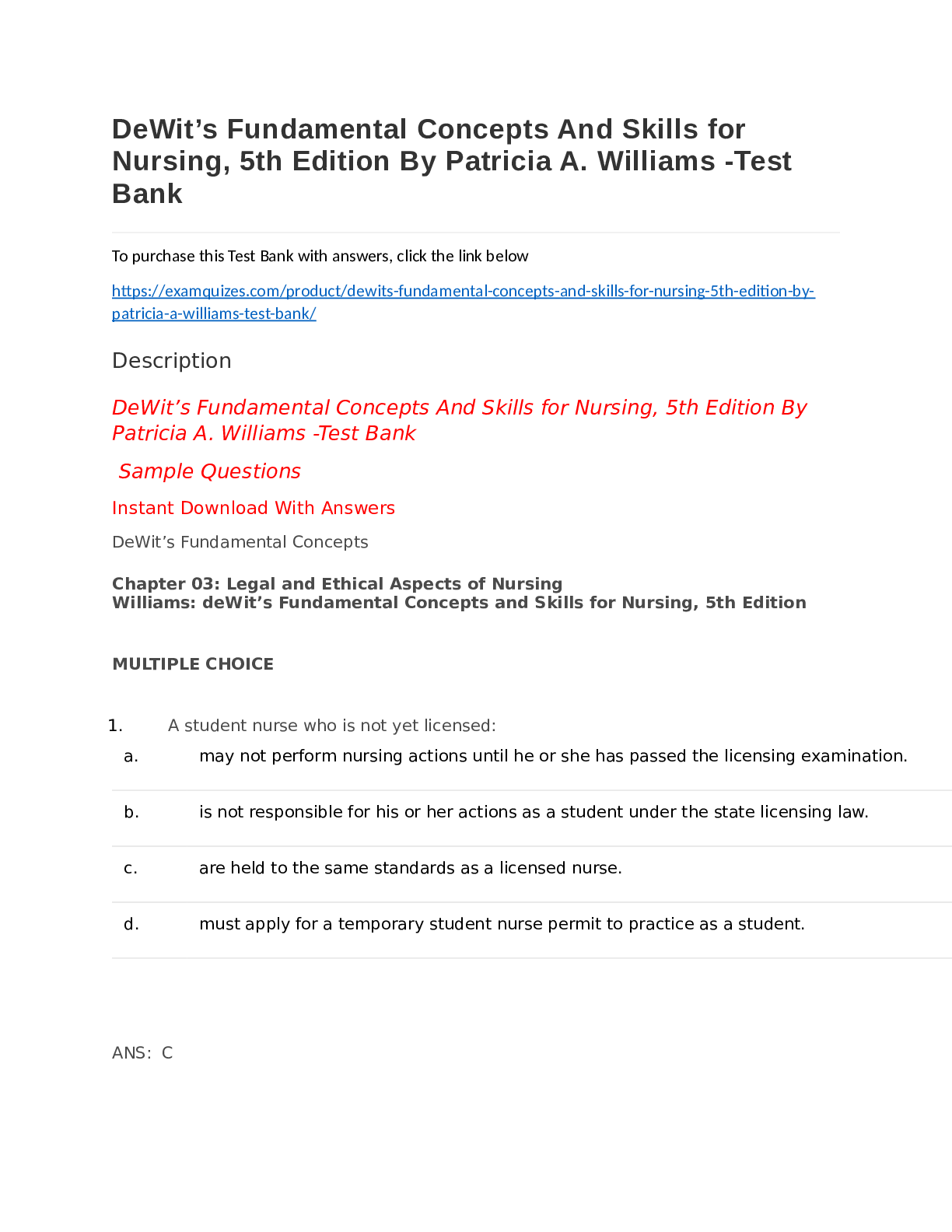
Reviews( 0 )
Document information
Connected school, study & course
About the document
Uploaded On
Aug 24, 2022
Number of pages
52
Written in
Additional information
This document has been written for:
Uploaded
Aug 24, 2022
Downloads
0
Views
69

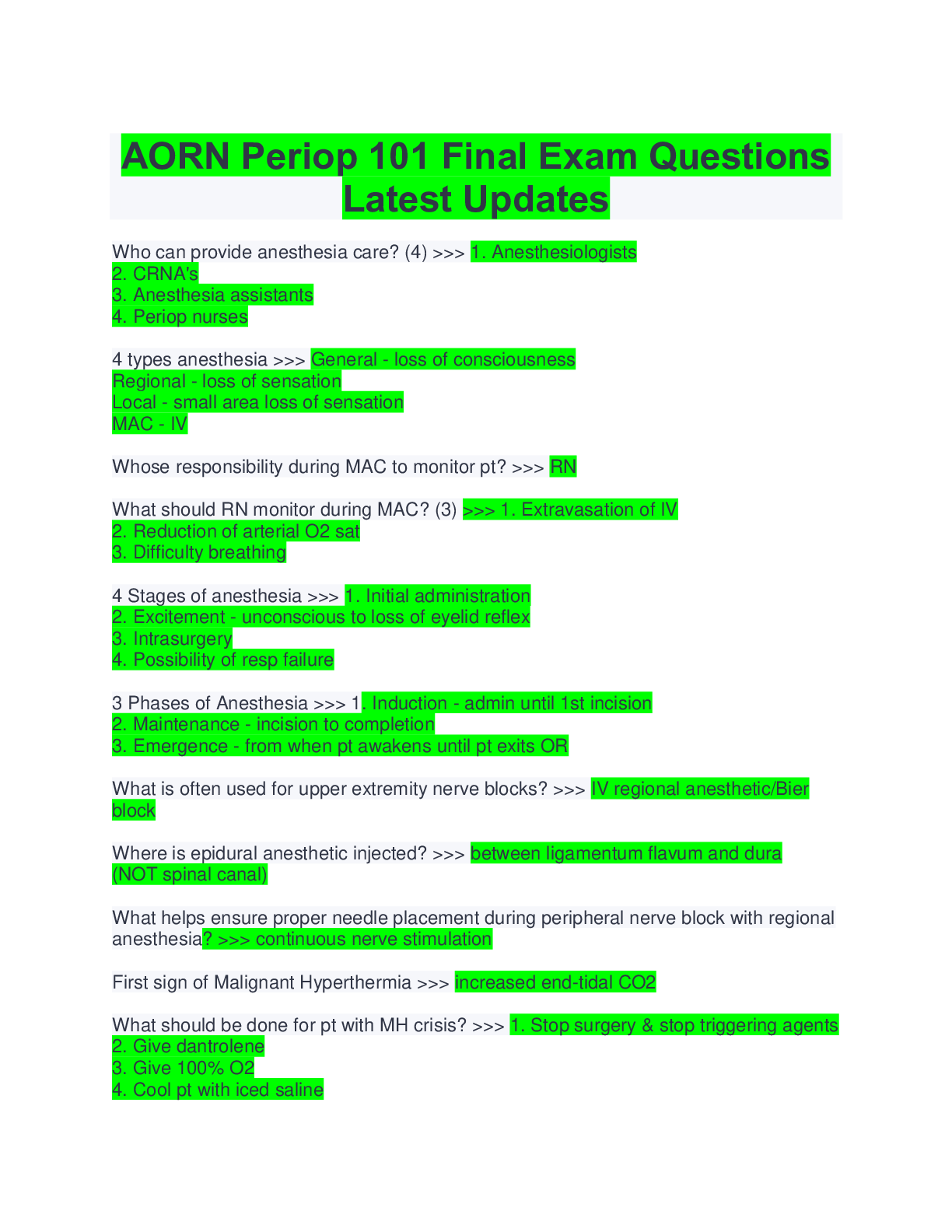
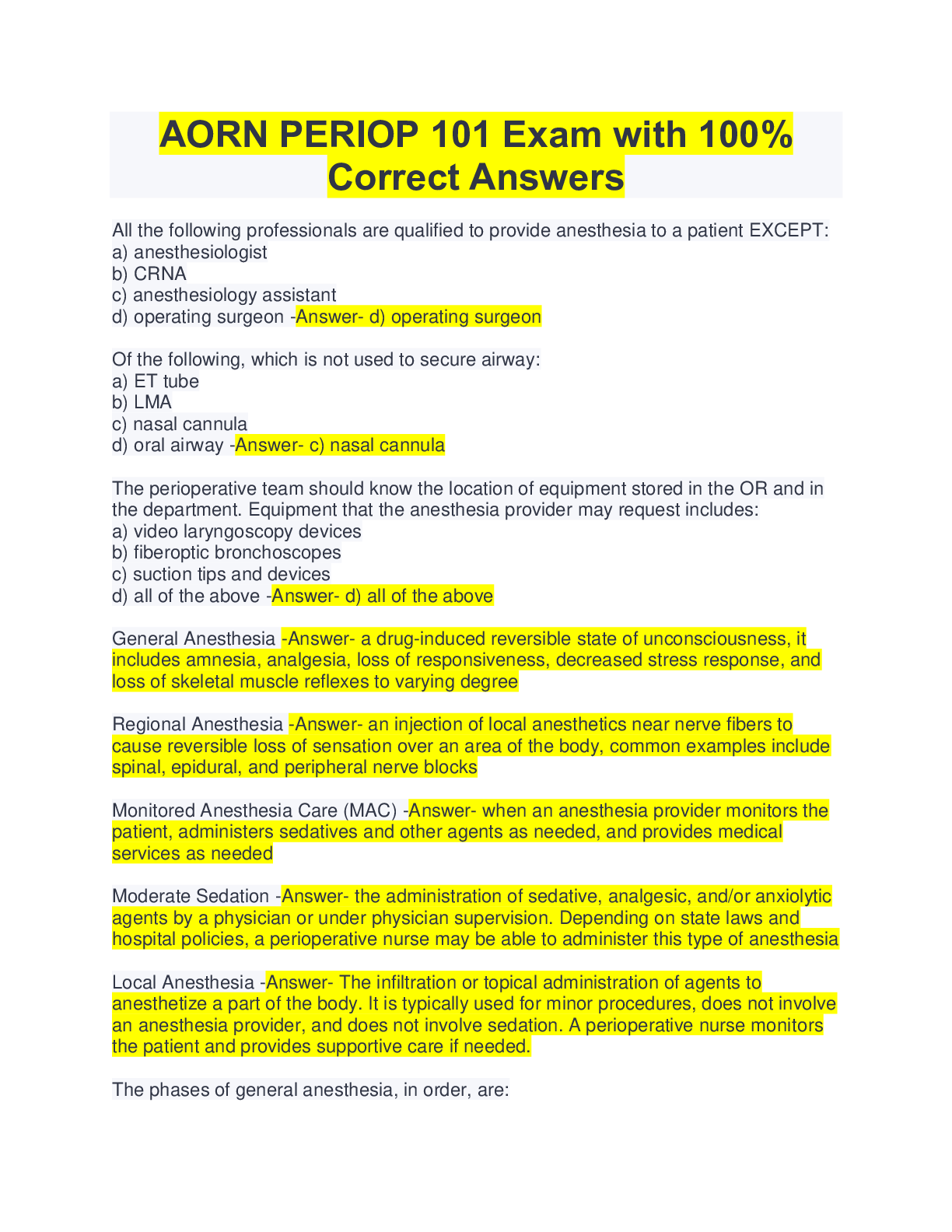

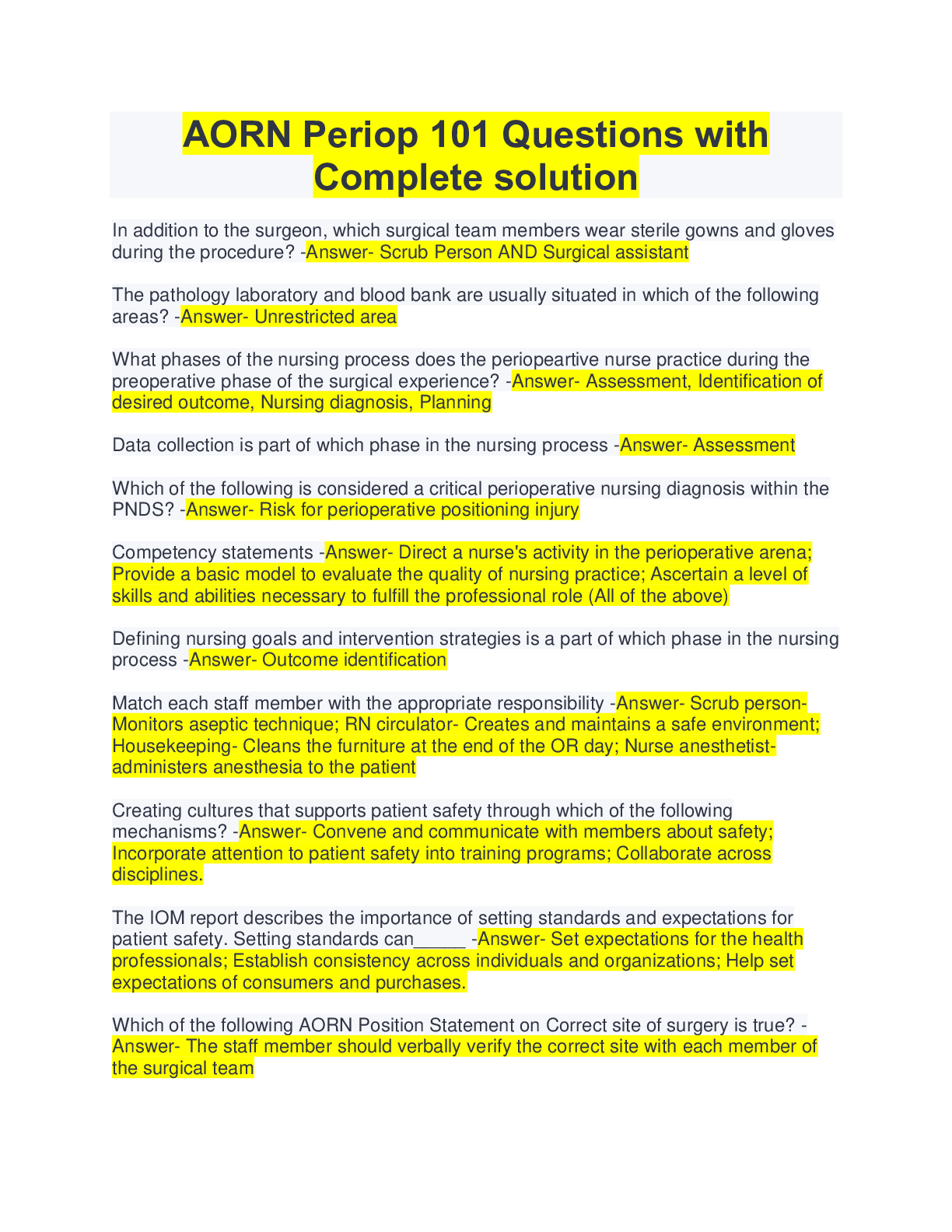
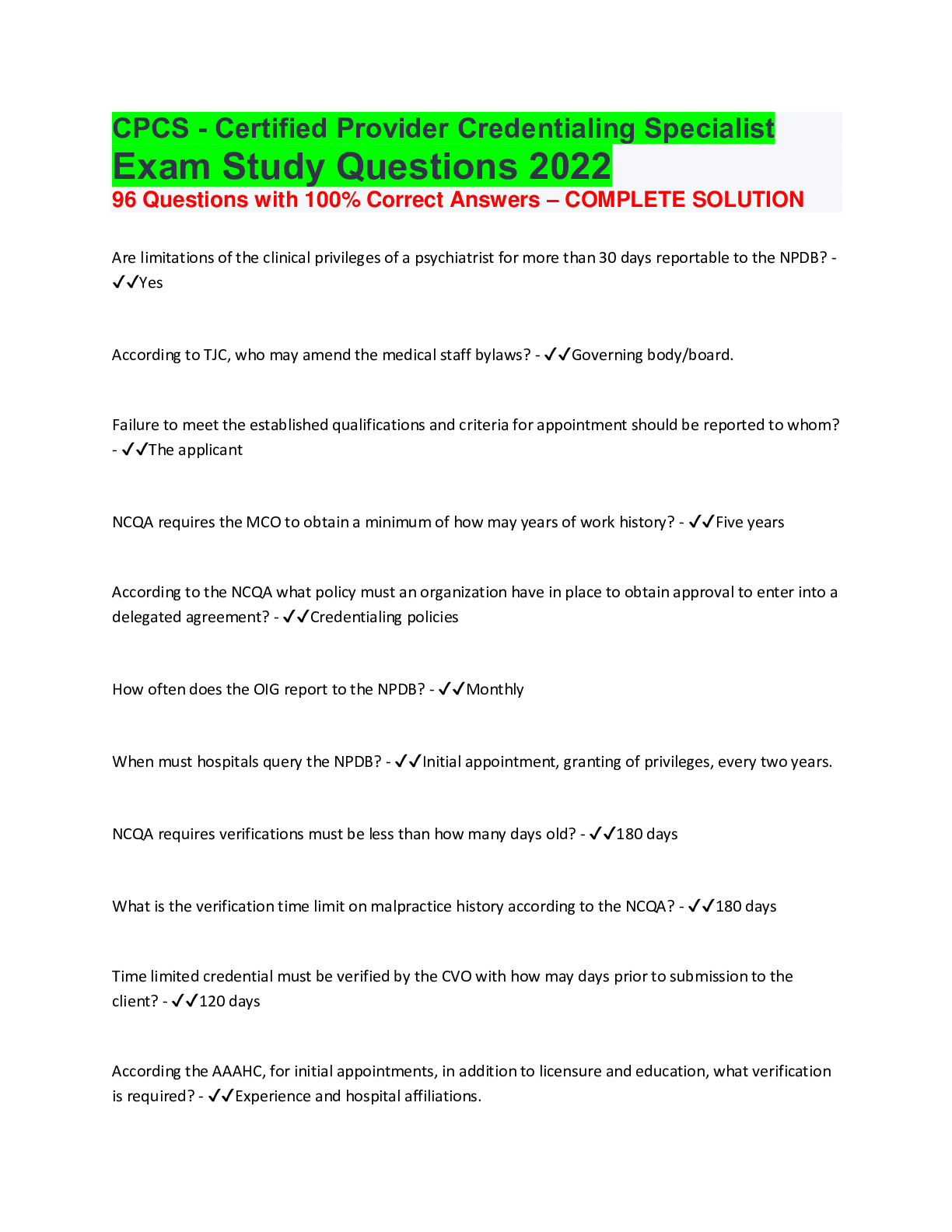
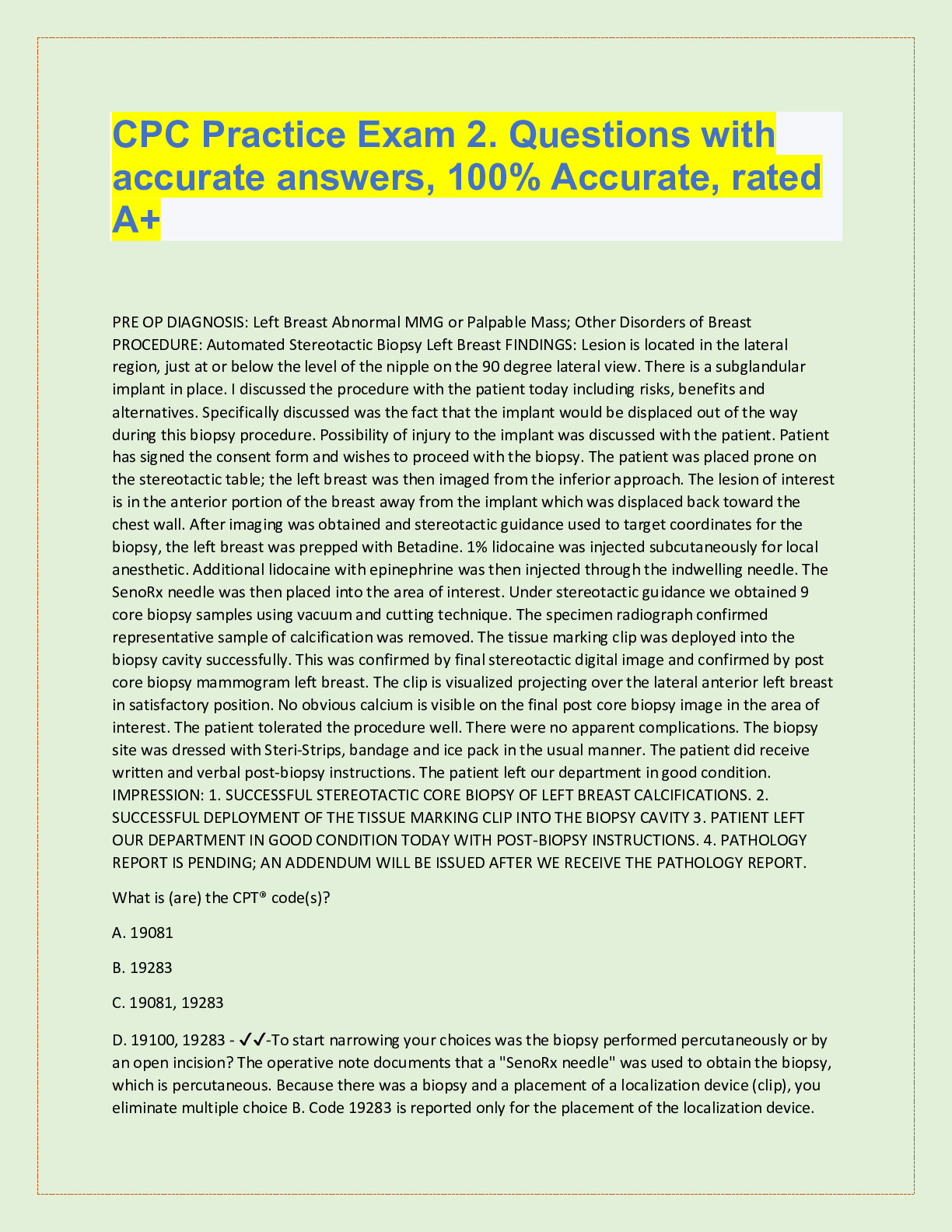
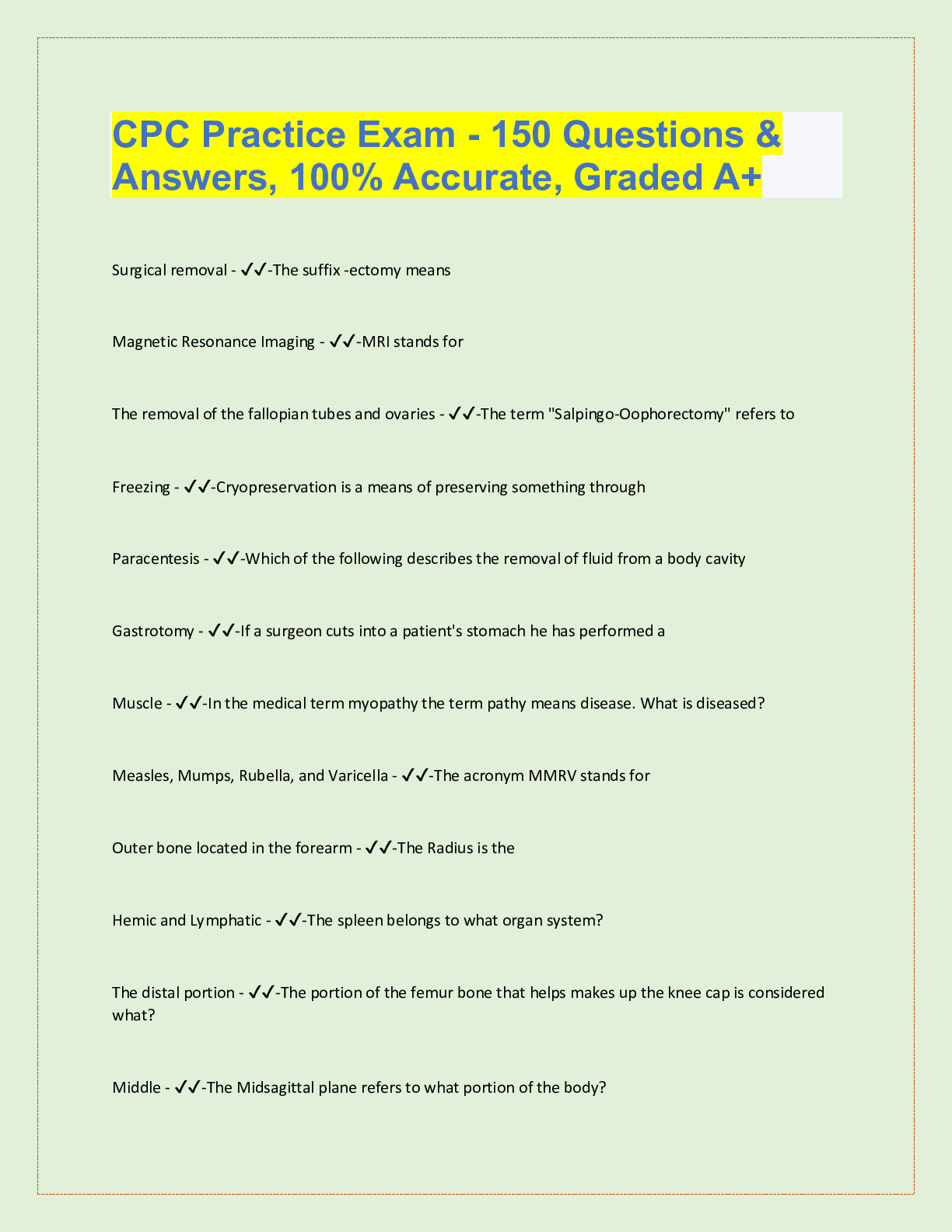
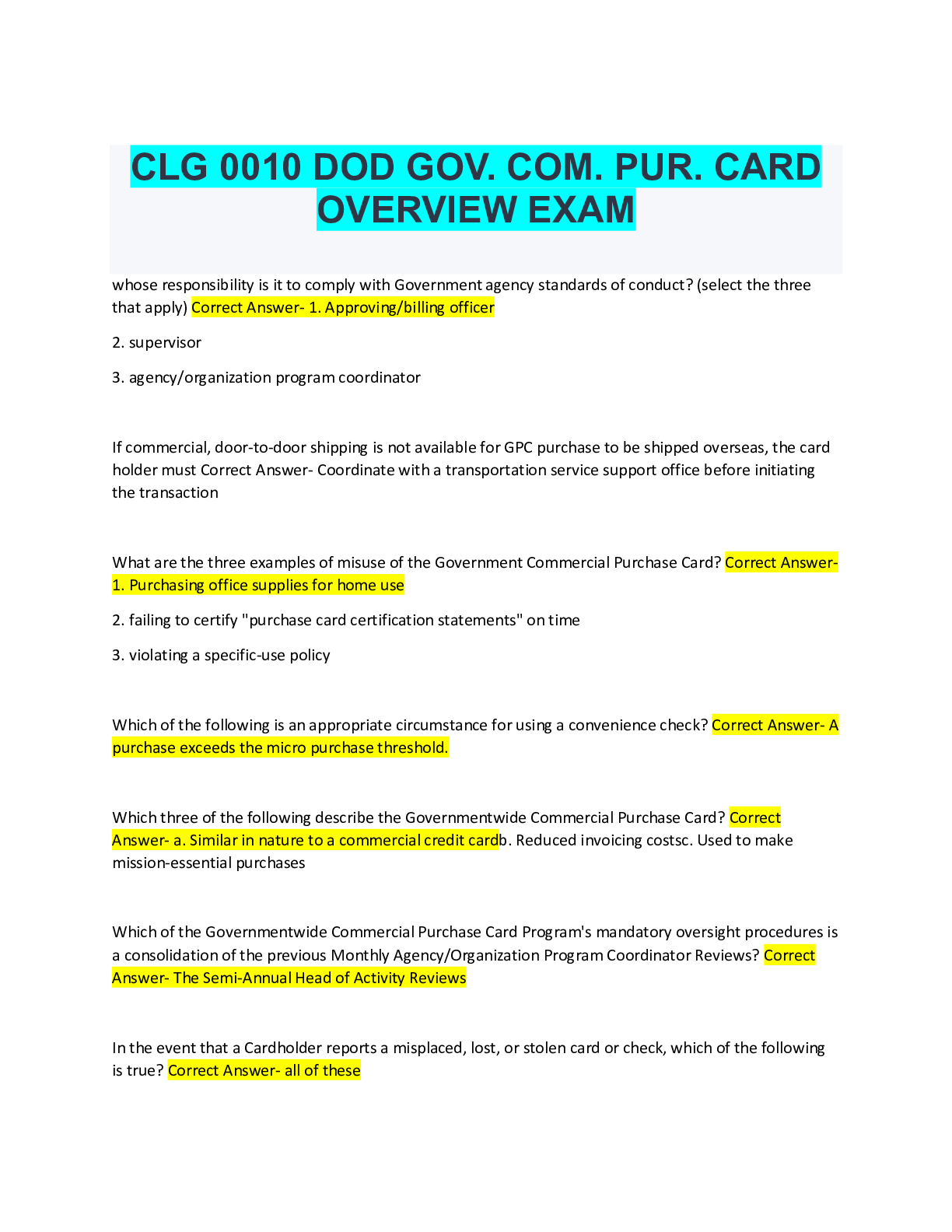

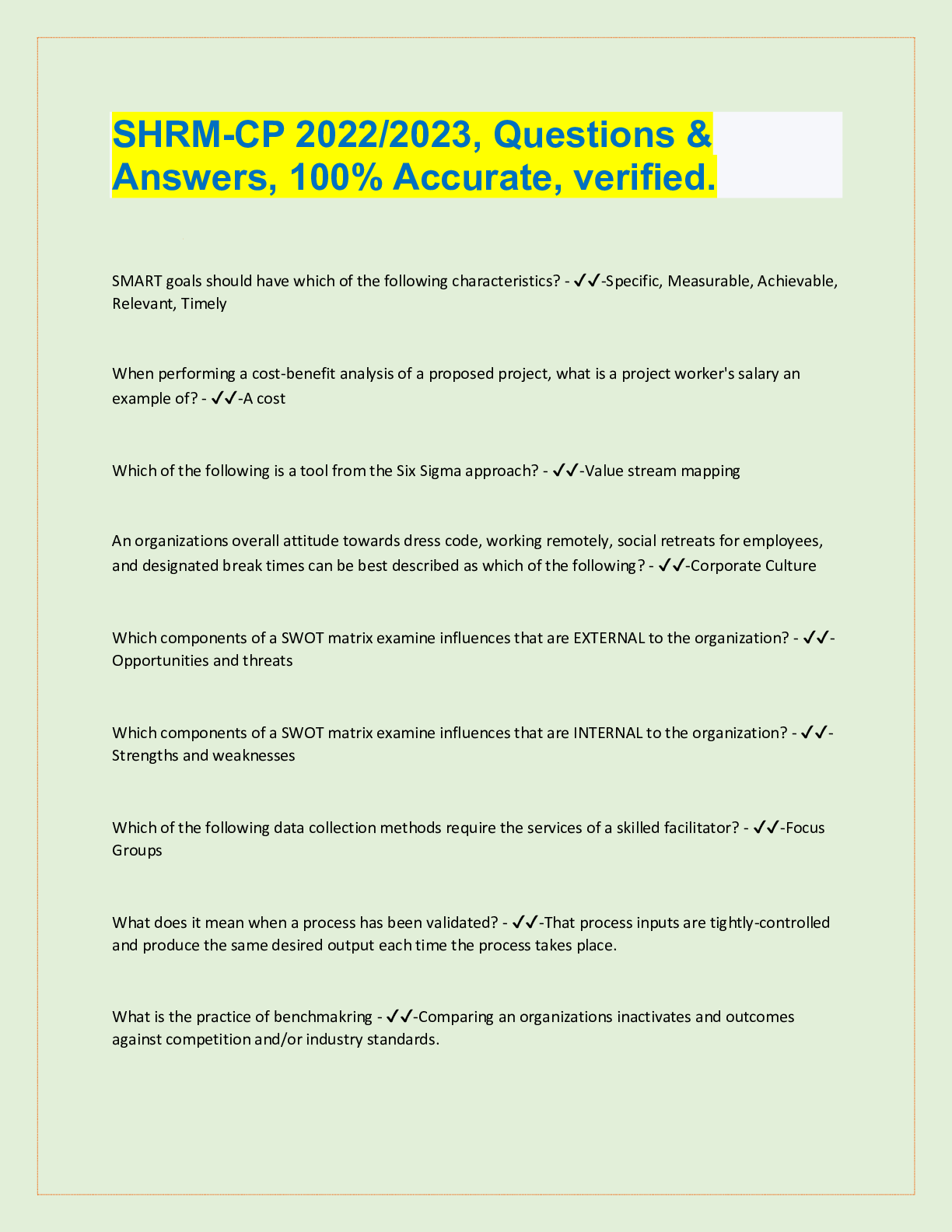
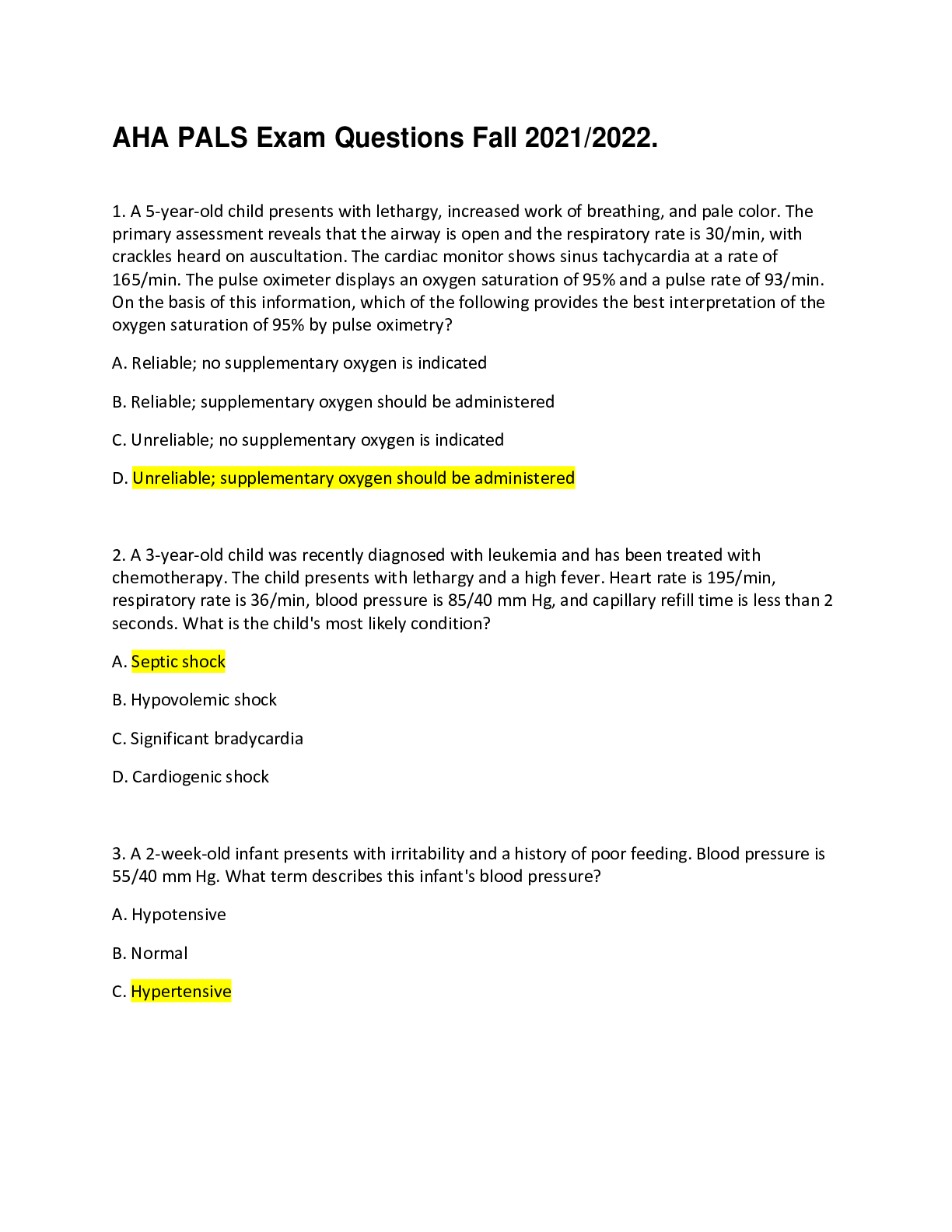
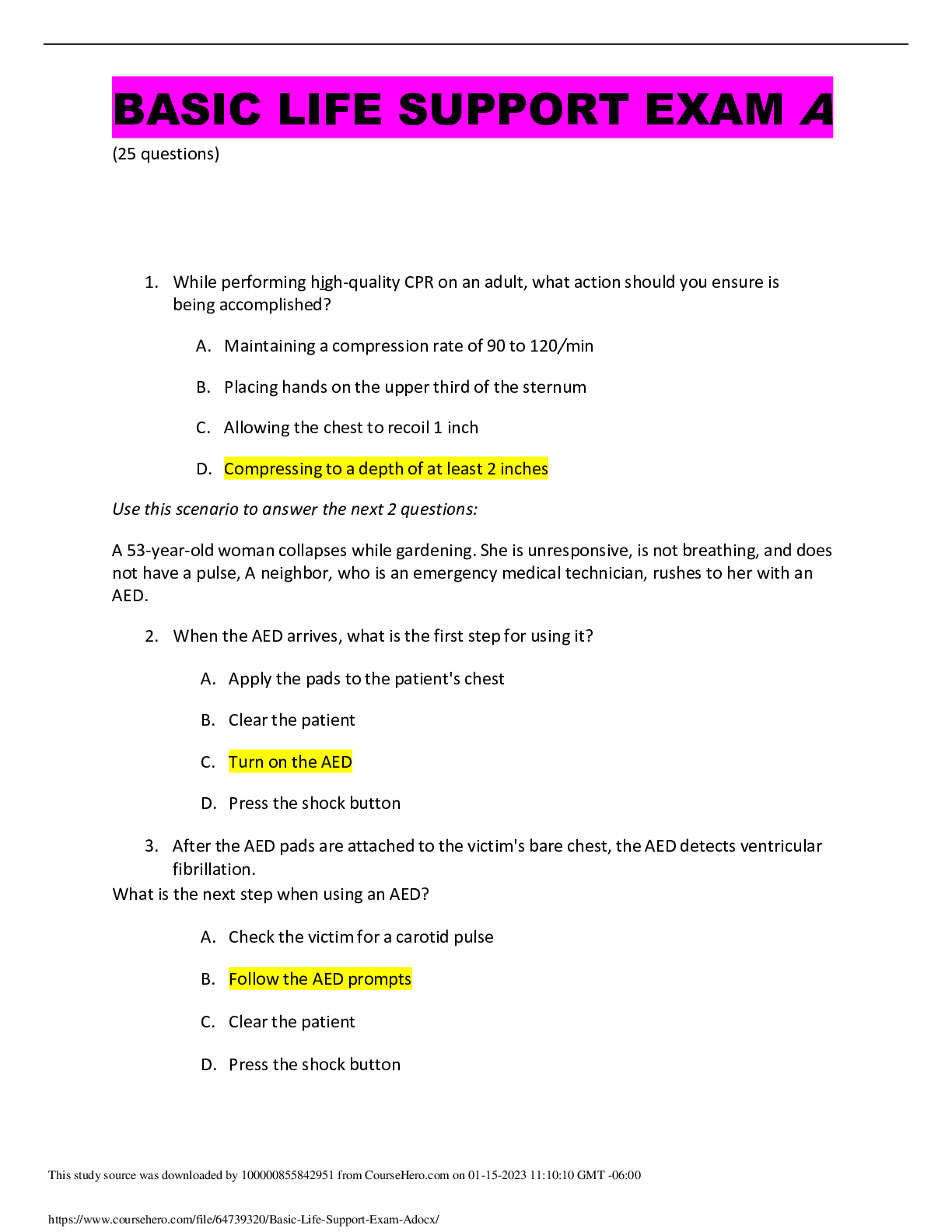
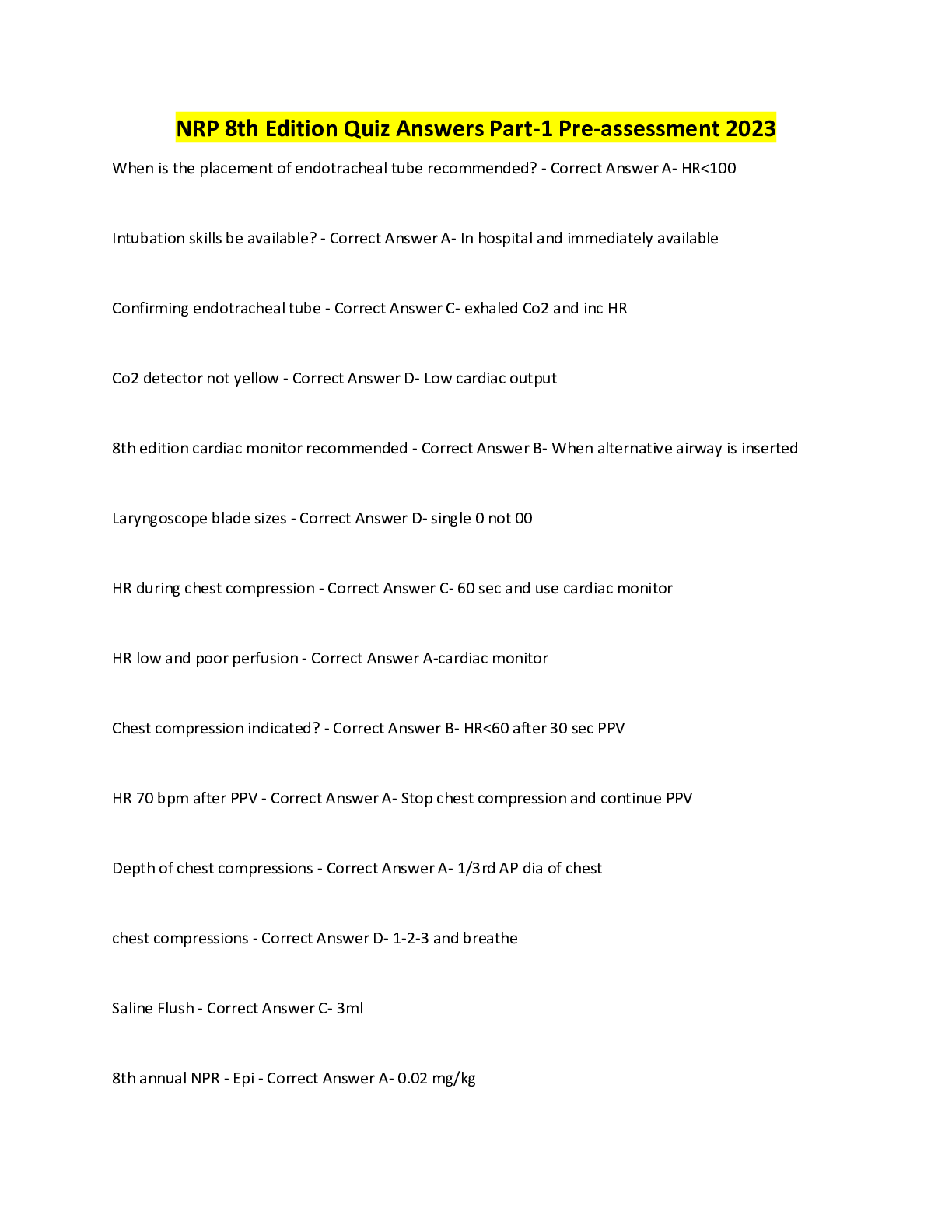

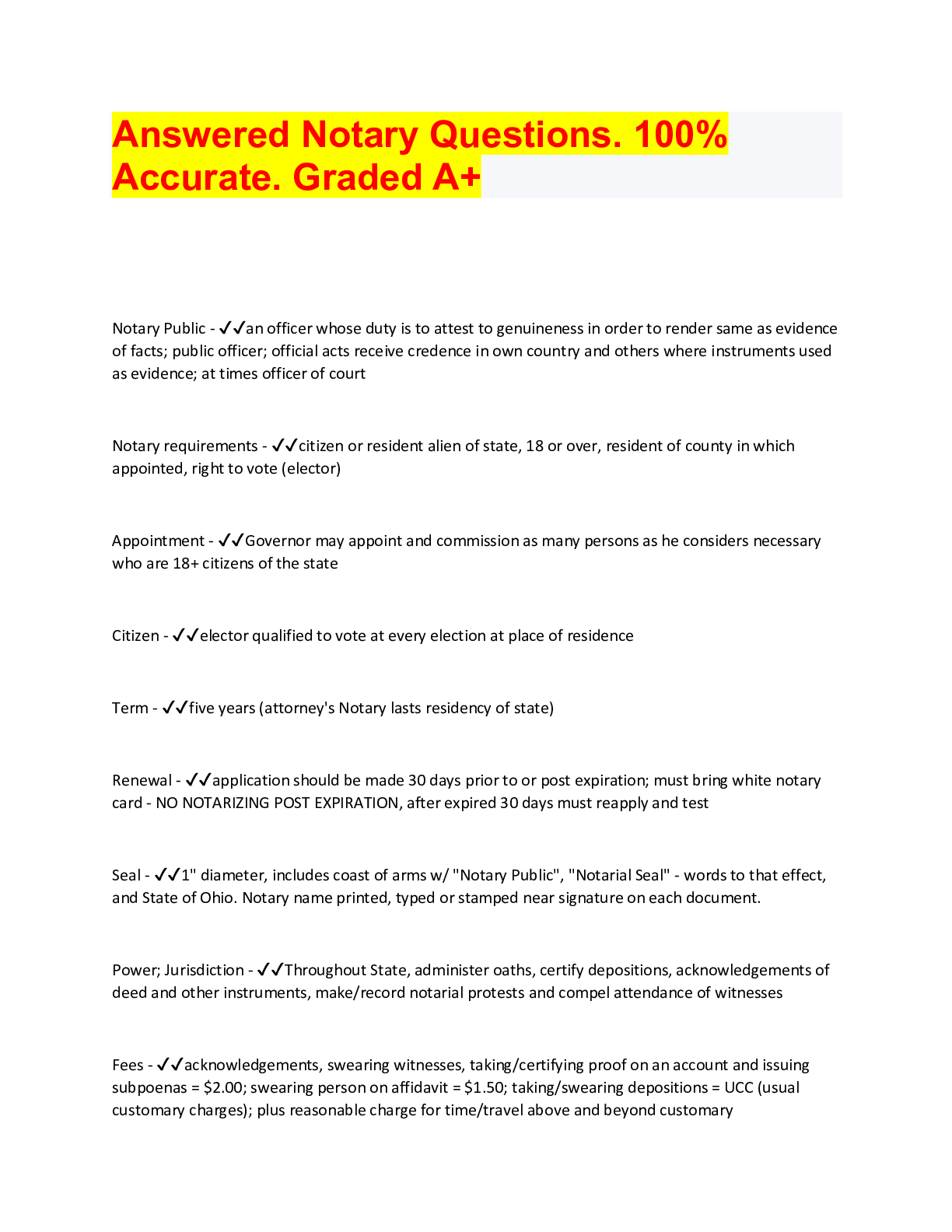


.png)
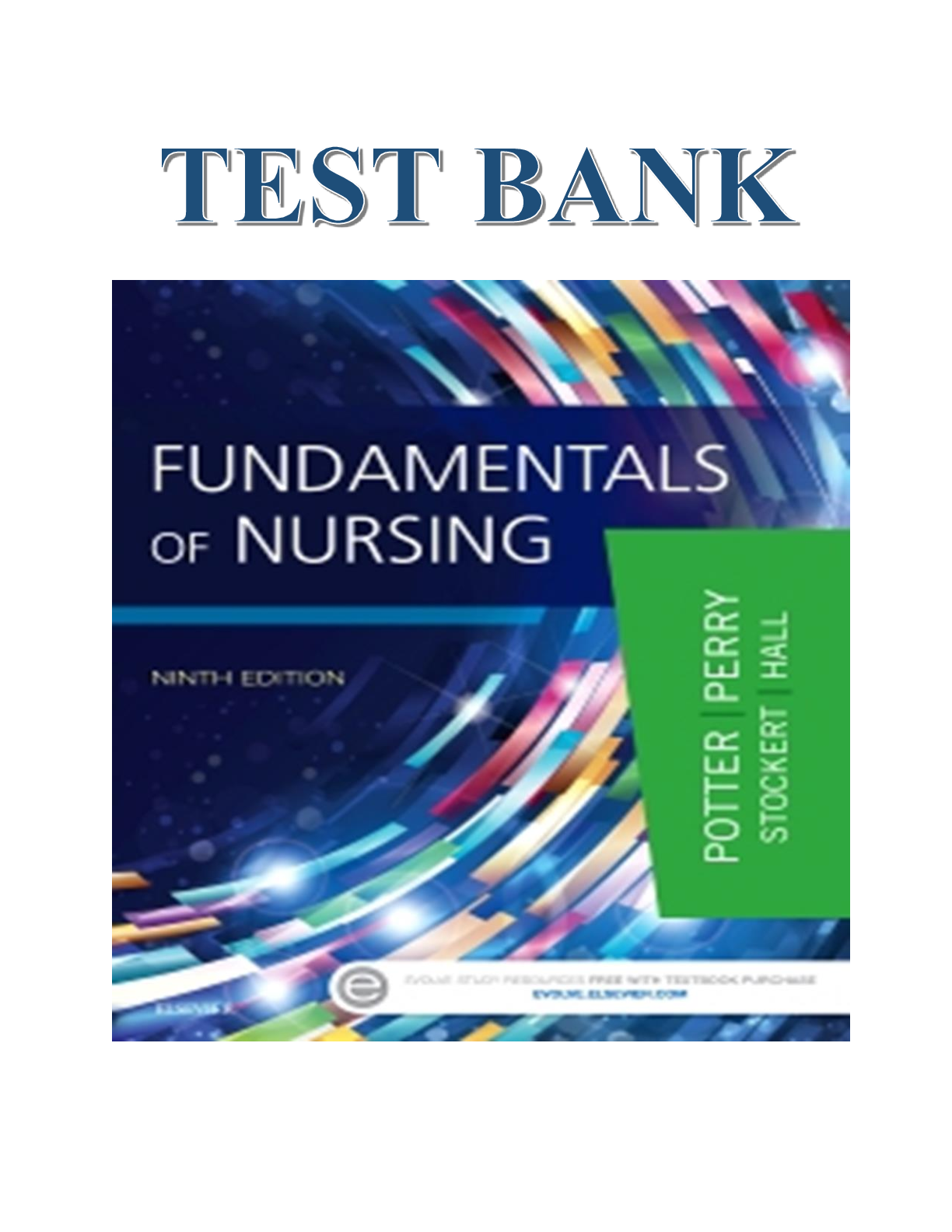
 Nursing, 8th Edition by Patricia Knecht.png)

